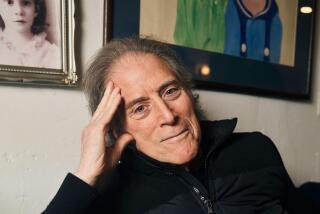From the Archives: Film and TV Actor Lloyd Bridges Dies
Lloyd Bridges, the athletic actor who made skin diving popular in his underwater 1950s television series “Sea Hunt” and continued working into his 80s as patriarch of an acting dynasty, died Tuesday. He was 85.
The craggy-faced Bridges, familiar to more recent audiences for the “Airplane!” movie series and recent television dramas, died at his home in Los Angeles, his agent Lee Stollman said. Bridges had suffered from a heart condition since 1992.
He made more than 100 motion pictures, and his most memorable roles were in supporting parts. He played a soldier in a 1949 film about racial prejudice in the Army, “Home of the Brave,” a deputy refusing to aid Gary Cooper’s sheriff in the 1952 classic “High Noon” and the gruff, hard-drinking controller in the 1980 spoof “Airplane” and its 1982 sequel.
In recent years, Bridges frequently acted with sons Beau and Jeff (whom he first put before the camera in “Sea Hunt”) in films and television productions. In 1986 the patriarch introduced grandson Jordan in the television movie “Thanksgiving Promise.” The true family feature starred Lloyd, Beau and Jordan and included Lloyd’s wife, Dorothy, in a supporting role and son Jeff in a walk-on.
Bridges appeared with Jeff in the films “Tucker: The Man and His Dream” in 1988 and “Blown Away” in 1994. He played a recurring role on Beau’s television series “Harts of the West” in 1993, and two years later was on cable television’s “The Outer Limits” with Beau and grandson Dylan. He had recently completed filming the motion picture “Meeting Daddy” with Beau, and had a role in the upcoming film “Jane Austen’s Mafia!” scheduled for release next summer.
On stage since the late 1930s, Bridges became a household face and name as Mike Nelson, ex-Navy frogman and freelance underwater investigator in television’s “Sea Hunt.” The innovative series, filmed largely in a tank at the now-defunct Marineland of the Pacific on the Palos Verdes Peninsula, ran from 1957 to 1961 and appeared in syndication through the 1960s.
Although he was an avid lifelong tennis player and swimmer and played basketball, baseball and football in his high school and college years, Bridges admitted that he had never tried skin diving until he landed the part.
“I’ve always loved the ocean,” he told The Times in 1960 in the series’ heyday. “Now skin diving is my favorite sport. It’s a funny thing. People see me dive on the show and think I’m an expert. . . . The skin diving equipment manufacturers tell us that in the three years ‘Sea Hunt’ has been on the air, interest in skin diving has zoomed.”
Although none equaled his initial success, Bridges appeared in several other television series. He was the Walter Mitty-like reporter Adam Sheppard, who became the protagonist in his own stories, in “The Lloyd Bridges Show” in 1962-63; Rod Serling’s “The Loner” in 1965-66; the manager in “San Francisco International Airport” in 1970-71; the star of “Lloyd Bridges’ Water World” in 1972; street cop “Joe Forrester” in 1975-76; owner of a modeling agency in “Paper Dolls” in 1984; and editor Jonathan “Jo Jo” Turner in “Capitol News” in 1990.
He was also familiar in 1980s television mini-series, including “Roots,” “How the West Was Won,” “East of Eden,” “The Blue and the Gray” and “George Washington,” and played Jefferson Davis in “North and South, Book II.”
Born Lloyd Vernet Bridges II in San Leandro, Calif., Bridges fell in love with the movies he watched in a theater owned by his father. He studied political science and pre-law at UCLA but also joined and became president of the University Dramatic Society.
His collegiate success with Shakespearean roles and in Sophocles’ “Oedipus Rex” earned him work in regional theater.
He made his professional stage debut in Berkeley as Lucentio in “The Taming of the Shrew,” and in 1937 made his Broadway debut in a bit part in Shakespeare’s “Othello.”
That year he also became a founding member of the Off-Broadway company called the Playroom Club, and taught dramatics at a private school.
On Broadway, he appeared in such plays as “Night Must Fall,” “Stage Door,” “Death Takes a Holiday,” “A Doll’s House” and “One Sunday Afternoon.”
Spotted by a Columbia Pictures talent scout, Bridges moved to Hollywood and made his screen debut in 1941 in “The Lone Wolf Takes a Chance.”
Bridges also took dramatic roles on radio and, as television made its impact, in live dramatic series such as “Studio One” and “Goodyear Playhouse.”
A member of the Actors Lab group in Hollywood and opposed to prejudice against any group, Bridges was put on Hollywood’s blacklist for alleged Communist leanings during the early 1950s. But he cleared his name with the FBI and congressional committees and returned to work.
In 1994, Bridges and his wife, Dorothy, whom he met when they were students at UCLA, received the Ralph Bunche Peace Award commemorating the United Nations Year of the Family.
Besides his wife and two sons, Bridges is survived by a daughter, Lucinda, and 11 grandchildren.
More to Read
Start your day right
Sign up for Essential California for the L.A. Times biggest news, features and recommendations in your inbox six days a week.
You may occasionally receive promotional content from the Los Angeles Times.






